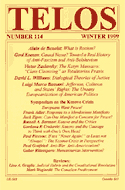On Tuesdays at the TELOSscope blog, we reach back into the archives and highlight an article whose critical insights continue to illuminate our thinking and challenge our assumptions. Today, Timothy Stacey looks at Peter Schneider’s “Intervention in Kosovo,” from Telos 115 (Spring 1999), and Gábor Rittersporn’s “Humanitarian Intervention?” from Telos 114 (Winter 1999).
 As NATO operations in Iraq whittle down to a bare minimum and debate rages on over the worth of continued involvement in Afghanistan, it is worth reflecting on the arguments surrounding the initial intervention. So some media pundits argue. The problem many had with the intervention in Iraq and continue to have with the intervention in Afghanistan is that they very quickly departed from the initial objectives conveyed to the public, becoming campaigns with no clear mission and no end in sight. Foul play is suspected. The (non)intervention in Kosovo and Rwanda helps to clarify this point. Kosovo was a clear case of humanitarian intervention at its most black and white. The military option was a last resort and when used was proportional. Likewise, Rwanda provides a black-and-white example at the opposite end of the spectrum: clearly military intervention was missed. To summarize: Kosovo and Rwanda clear, Iraq and Afghanistan not so clear.
As NATO operations in Iraq whittle down to a bare minimum and debate rages on over the worth of continued involvement in Afghanistan, it is worth reflecting on the arguments surrounding the initial intervention. So some media pundits argue. The problem many had with the intervention in Iraq and continue to have with the intervention in Afghanistan is that they very quickly departed from the initial objectives conveyed to the public, becoming campaigns with no clear mission and no end in sight. Foul play is suspected. The (non)intervention in Kosovo and Rwanda helps to clarify this point. Kosovo was a clear case of humanitarian intervention at its most black and white. The military option was a last resort and when used was proportional. Likewise, Rwanda provides a black-and-white example at the opposite end of the spectrum: clearly military intervention was missed. To summarize: Kosovo and Rwanda clear, Iraq and Afghanistan not so clear.
A quick look at the academic understanding of intervention in Kosovo at the time, however, suggests that debates regarding the legitimacy of war were just as heated then as they are now. Take Peter Schneider’s “Intervention in Kosovo,” written in the spring of 1999:
The objection that one cannot intervene in Kosovo, because there was no intervention in Rwanda and elsewhere, conveys a valid accusation, but it would be absurd to conclude that action in Kosovo is prohibited. Such a prohibition would amount to the cynical axiom that the terrible failure of the world community in Rwanda necessitates a duty to further failures. While the increased misery of the refugees in the context of the bombings tempted me to side with the anti-interventionists, in the end their arguments turn out to rely on intellectual and moral self-deception. In principled terms, the dispute between violence and non-violence is clear. While there may be no just war, there are necessary and unavoidable ones. Well before the massacres in Bosnia, it was clear that one does not remain innocent if one refrains from offering timely opposition to dictators and tyrants, if necessary with force. (145)
Schneider comes out entirely in support of the war. Indeed, his chief criticism is that NATO’s refusal to lose a single life in the process, by limiting its actions to bombing, renders its campaign unnecessarily destructive. But that he has to come out in such full-fledged support of war suggests there was no general consensus at the time. As Gábor Rittersporn explains in “Humanitarian Intervention?” (also published in 1999):
The hypothesis of a disinterested humanitarian motivation is untenable, however appalling the large-scale use of violence by Serbs to drive out defenseless people from their homes in Kosovo. When all is said and done, Western indignation at the violation of human rights is no less selective than in the past. There is no reason to understand current Western policies in the Balkans as the promising start of an era when the interests of the weak are going to be selflessly defended by the best and the brightest. On the contrary, there are grounds to fear that there is a major danger in the practice to decree which people are and which are not entitled to enjoy supposedly universal human rights, and to apply military force to assist some populations, all the while ignoring the ordeal of the others.
The danger does not lie in the arbitrary appeal to high principles: we have become accustomed to it. The threat lies in the arbitrary resort to force by those who feel capable of deciding who is entitled to rights and who is not, and in the conflicts it is likely to provoke anywhere in the world. (180)
It is not simply in Iraq and Afghanistan that foul play is suspected. In every NATO conflict since the American invasion of Vietnam, the public has instinctively questioned whether there is not an ulterior motive, or whether it is not in fact a colossal waste of life.
It is always worth reassessing the worth of involvement in a conflict, not least for those we purport to be helping. But before we look to support knee-jerk troop withdrawals, we would do wisely to remember that most Western conflicts of this half of the twentieth century have at one point or another had no clear mission and no end in sight.
Read the full versions of Peter Schneider’s “Intervention in Kosovo” and Gábor Rittersporn’s “Humanitarian Intervention?” at the TELOS Online website. If you are affiliated with an institution that is an online subscriber to Telos, you have free access to our complete online archive. If not, you can purchase 24-hour access to this and other Telos articles at the low rate of $5/article.








